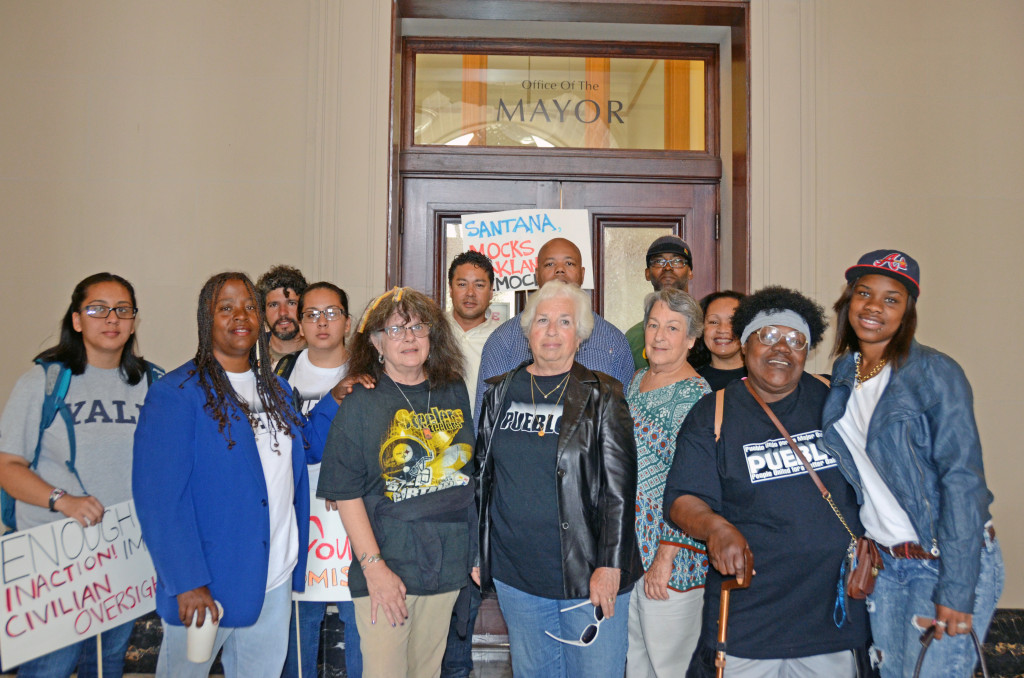Community Coalition Wins Police Accountability Victory
Jul 26, 2013
Posted in Police-Public Safety, Responsive Government
By Ken A. Epstein
After struggling for two years to overcome city staff resistance to carrying out a council-approved reform of intake of complaints against police, PUEBLO and other community organizations finally may be seeing light at the end of the tunnel
At the Public Safety Committee meeting this week, it was announced that the civilian complaint intake workers would be hired by mid November.
Up until now, supporters of the City Council decision to put intake of all police complaints into the hands of the Civilian Police Review Board (CPRB) have been continually frustrated by what they have seen as City Administrator Deanna Santana’s actions that “at first delayed and then thwarted and subverted” the decision to hire, train and place intake workers at the office of the CPRB, located at Frank Ogawa Plaza.

This past Monday morning they took their demand to Mayor Jean Quan, Santana’s boss, who until then had refused to take a stand on the issue or set a date to meet with them.
A delegation of about 15 people, carrying picket signs, went to Quan’s City Hall office, determined to sit there until she talked to them. One of the signs read, “Quan Keep Your Promise.”
They found the door to the office waiting room locked. A staff member inside said through the door that the group could continue standing outside in the hallway if they were peaceful.
Otherwise, the police would be called. All staff were involved in meetings and could not meet with the group, the voice in the office said.
However, Anne Campbell Washington, the mayor’s chief of staff, finally met with four members of the group, who explained their concerns. They were told mayor would meet with them, Tuesday, July 30.
Fresh from that victory, PUEBLO and other community attended Tuesday evening’s Public Safety Committee meeting, where they announced they had received support for their position from both Thomas Frazier, Thelton Henderson’s compliance officer over OPD, and Mayor Quan.
“Now it’s clear that there is consensus about the direction. The mayor fully supports that the new intake personnel will reside with the CPRB,” said Rashidah Grinage, executive director of PUEBLO, who also handed out a copy of an email from federal Monitor Robert Warshaw that said he and Frazier had no objections to moving complaint intake to CPRB.
Grinage told the Post she had learned about the mayor’s position earlier Tuesday in a conversation with Campbell Washington.
In response to questions from the Post, Quan backed the reform of complaint intake. “This is sound policy that I have been advocating for since I was on the City Council. It has taken longer than I wanted it to, but it is well underway, and we are on track to meet the City Council’s deadline,” she said
“To the extent that challenges arise throughout this process, we will work collaboratively with the parties to resolve them and move forward. Nothing will stand in the way of progress on completing these reforms.”
Presenting her report at the meeting, Santana finally gave a timetable for hiring civilian intake workers. She said the process will be completed by Nov. 15
Santana did not refer to her position, stated an earlier Public Safety meeting, that training of intake workers would take up to 18 months and will be conducted by and at OPD’s Internal Affairs Division. After training is completed, the civilian workers might continue to be located at OPD, she said.
Public speakers were enthusiastic about the announced timetable but remained concerned about Santana’s proposals for training and housing the new workers.
“It is absolutely imperative that the civilians who are hired not be placed temporarily or otherwise within the police department. If you do that, there is no need to make any of these changes,” said community member Claudine Tong.
“I urge you to listen to the public will,” said Kim Mejia-Cuellar, a Yale student and graduate of Fremont High School.
“There seems to be a lack of political will to move this process forward,” said Alona Clifton, co-chair of the John George Democratic Club.
Responding, council members assured community members they had the political will to make police reform happen.
The council passed the resolution transferring intake to civilians two years ago, said Councilmember Libby Schaaf, while the “city was in a huge financial crisis. Yet we allocated a million dollars to fund this change.”
“ You want to talk about political will, this council had the political will and still has the political will to make this change,” she said.
Councilmember Lynette McElhaney acknowledged PUEBLO and other community groups that have fought to implement the council’s decision.
“I want to publicly thank PUEBLO and the advocacy of the community to make sure this remained a front burner issue,” McElhaney said, adding that she backs “the concerns the community continues to voice about making sure that as we train the civilians, we ensure they are impartially trained to maintain the integrity” of their work.
The Oakland Police Accountability Coalition includes PUEBLO and more than 20 other organizations, including the Oscar Grant Foundation, Oakland Black Caucus, Nation of Islam, Black Women Organized for Political Action, Paul Robeson Chapter ACLU, Allen Temple Baptist Church, Lakeshore Baptist Church and John George Democratic Club.